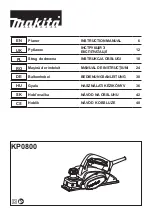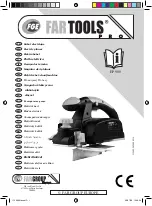
15 ENGLISH
Operation with wire wheel brush
Optional accessory
CAUTION:
Check operation of wire wheel
brush by running tool with no load, insuring that
no one is in front of or in line with the wire wheel
brush.
CAUTION:
Do not use wire wheel brush that
is damaged, or which is out of balance.
Use of
damaged wire wheel brush could increase potential
for injury from contact with broken wires.
CAUTION:
ALWAYS use guard with wire
wheel brushes, assuring diameter of wheel fits
inside guard.
Wheel can shatter during use and
guard helps to reduce chances of personal injury.
►
Fig.30:
1.
Wire wheel brush
Unplug tool and place it upside down allowing easy
access to spindle.
Remove any accessories on spindle. Thread wire wheel
brush onto spindle and tighten with the wrenches.
NOTICE:
Avoid applying too much pressure
which causes over bending of wires when
using wire wheel brush.
It may lead to premature
breakage.
Operation with abrasive cut-off /
diamond wheel
Optional accessory
WARNING:
When using an abrasive cut-off
/ diamond wheel, be sure to use only the special
wheel guard designed for use with cut-off wheels.
(In some European countries, when using a diamond
wheel, the ordinary guard can be used. Follow the
regulations in your country.)
WARNING:
NEVER use cut-off wheel for side
grinding.
WARNING:
Do not "jam" the wheel or apply
excessive pressure. Do not attempt to make an
excessive depth of cut.
Overstressing the wheel
increases the loading and susceptibility to twisting
or binding of the wheel in the cut and the possibility
of kickback, wheel breakage and overheating of the
motor may occur.
WARNING:
Do not start the cutting operation
in the workpiece. Let the wheel reach full speed
and carefully enter into the cut moving the tool
forward over the workpiece surface.
The wheel
may bind, walk up or kickback if the power tool is
started in the workpiece.
WARNING:
During cutting operations, never
change the angle of the wheel.
Placing side pres-
sure on the cut-off wheel (as in grinding) will cause
the wheel to crack and break, causing serious per
-
sonal injury.
WARNING:
A diamond wheel shall be oper-
ated perpendicular to the material being cut.
►
Fig.31:
1.
Lock nut
2.
Abrasive cut-off wheel / dia
-
mond wheel
3.
Inner flange
4.
Wheel guard
for abrasive cut-off wheel / diamond wheel
As for the installation, follow the instructions for
depressed center wheel.
The direction for mounting the lock nut and the
inner flange varies by wheel type and thickness.
Refer to the following figures.
When installing the abrasive cut-off wheel:
►
Fig.32:
1.
Lock nut
2.
Abrasive cut-off wheel
(Thinner than 4 mm (5/32"))
3.
Abrasive cut-
off wheel (4 mm (5/32") or thicker)
4.
Inner
flange
When installing the diamond wheel:
►
Fig.33:
1.
Lock nut
2.
Diamond wheel (Thinner than
4 mm (5/32″))
3.
Diamond wheel (4 mm
(5/32″) or thicker)
4.
Inner flange
MAINTENANCE
CAUTION:
Always be sure that the tool is
switched off and unplugged before attempting to
perform inspection or maintenance.
NOTICE:
Never use gasoline, benzine, thinner,
alcohol or the like. Discoloration, deformation or
cracks may result.
To maintain product SAFETY and RELIABILITY, repairs,
carbon brush inspection and replacement, any other
maintenance or adjustment should be performed by
Makita Authorized or Factory Service Centers, always
using Makita replacement parts.
Replacing dust cover brush
Worn brushes can be replaced. To remove the brushes,
pull them off by using slotted driver or other appropriate
tool.
►
Fig.34:
1.
Brush (large)
2.
Brush (small)
Inserting new brushes into retaining grooves by pushing
down from above.
►
Fig.35
At this time, ensure that brushes are fully hooked onto
hooks on outer edges of grooves.
►
Fig.36:
1.
Hook
Air vent cleaning
The tool and its air vents have to be kept clean.
Regularly clean the tool's air vents or whenever the
vents start to become obstructed.
►
Fig.37:
1.
Exhaust vent
2.
Inhalation vent
Summary of Contents for PC5010C
Page 2: ...1 Fig 1 1 Fig 2 1 Fig 3 1 Fig 4 1 2 Fig 5 1 2 Fig 6 1 2 3 4 Fig 7 2 ...
Page 3: ...1 Fig 8 2 1 3 4 5 6 Fig 9 Fig 10 1 2 4 3 Fig 11 Fig 12 1 Fig 13 3 ...
Page 4: ...Fig 14 Fig 15 Fig 16 1 2 3 Fig 17 1 2 3 4 Fig 18 1 2 Fig 19 1 2 4 3 Fig 20 1 2 Fig 21 4 ...
Page 5: ...1 2 4 3 Fig 22 1 Fig 23 1 2 Fig 24 Fig 25 1 2 3 4 Fig 26 1 2 3 Fig 27 Fig 28 1 Fig 29 5 ...
Page 7: ...2 5 2 2 11 12 4 3 5 6 7 8 9 10 1 13 3 14 5 3 Fig 38 7 ...
Page 111: ...111 ...
















































